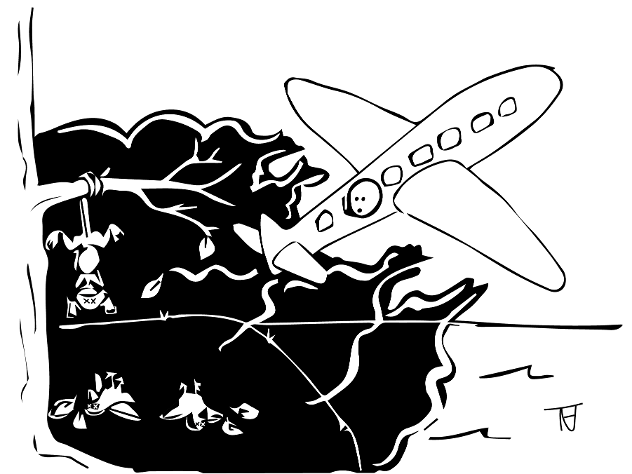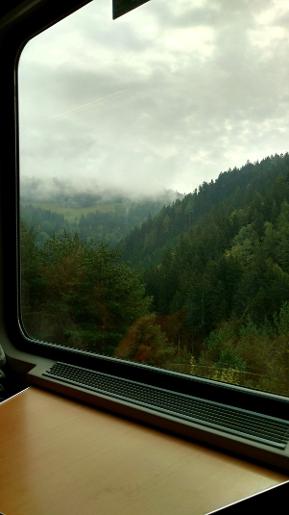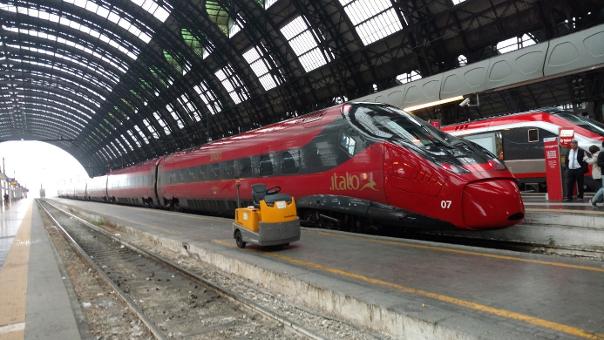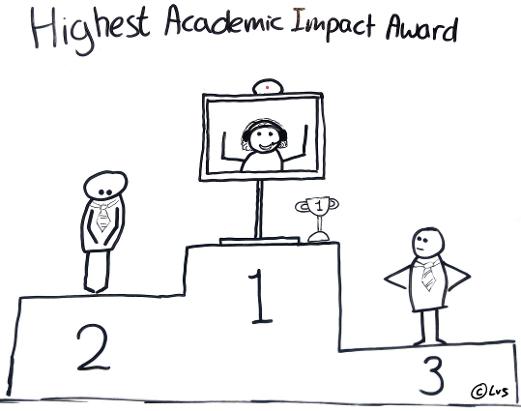TALES OF A NON-FLYING RESEARCHER
By Wolmet - Some people may wonder: Is it really possible to be a non-flying researcher? As I consider myself to be one, I will use this blogpost to tell you about my journey.
At the end of the year 2000, I fully got aware about the massive impact flying has on climate change. We were on a plane back from our honeymoon in Ecuador when my new husband mentioned this, and I was unable to shed this sinking feeling that our trip was actually contributing to the destruction of the beautiful nature we had just visited and was going to make life harder for the people living there. Together, we made the (unconscious) decision not to fly for holidays anymore and we found out that there are actually so many wonderful places that can be reached without flying, that we never regretted this decision.

Cartoon by Luc and Tanja
About two years later, I started as a PhD student in the department of Industrial Design at TU/e. As a researcher, it seems part of the job is flying to conferences. However, although I had not fully decided that flying was unacceptable for my professional life, I felt more and more that this distinction between my professional and my personal identity was not so easy to make. I thus opted for taking the train to conferences, and luckily, my supervisors never objected to this.
As a PhD student I visited conferences in e.g., Preston, Zürich, and Rome without flying. Of course, those trips sometimes took some more time than if I would have flown, but this time was usually well-spent on reading, preparing my presentations or just thinking.
"An unexpected advantage of my decision not to fly was actually that I sometimes opted for writing a journal paper instead of flying to conference to disseminate my work."
This paid off when I applied for a permanent position after a two-year postdoc in Sweden. The assessment report for this position put me on top of the candidate list, mainly because of my hIa (h-index adjusted for academic age and discipline). Indeed, a paper by Wynes, Donner, Tannason, and Nabors (2019) confirms that flying does not necessarily lead to a higher academic impact. They investigated the influence of career stage, research productivity, field of expertise, and other variables on academic air travel and associated emissions among 705 travelers at the University of British Columbia and found no relationship between air travel emissions and metrics of academic productivity including hIa.
After advancing my career and becoming an Associate Professor at the University of Gothenburg in 2013 I felt it that it was more difficult to completely avoid flying. Being a primary investigator in several European projects required me to visit project meetings, and while I always did my best to take the train (e.g., from Gothenburg to Birmingham, Brussels, and Paris) it was not always possible (e.g., a project meeting in Athens). The summer of 2018 however, which, as you may recall was particularly hot and dry, pushed me over the brink. I signed the pledge at NoFlyClimateSci.org, a group of Earth scientists, academics, and members of the public who either don’t fly or who fly less. Although signing this pledge does not necessarily mean that one promises to never fly, it worked for me in this way, and it made my life easier.
"Finally, I identified myself as a non-flying researcher, and I dared to vocalize my intention to never fly."
When I thus applied for a position as an Assistant Professor at the TU/e again, in the beginning of 2019, I openly told the hiring committee about my intention. I am happy and grateful that I, despite this resolution, got the opportunity to come back to my alma mater.
When I found out about the Low Carbon Travel Initiative at the TU/e in October, I thus immediately contacted them to give them my support. Currently, the group mostly consists of PhD students, which I think is somewhat surprising, because we, as more senior researchers, should set an example. According to a thesis written be Steve Westlake, “[l]eading by example by giving up flying appears to send a powerful and effective message that, in combination with structural changes in transport provision and different policy signals from government, could contribute to a shift away from unlimited flying as a social norm, as part of a collective effort to reduce carbon emissions” (Westlake, 2017). Having a clear university policy for sustainable traveling would also be a step in the right direction.
At the end of the day, I think being a non-flying researcher makes me a happier person. I now know that my behavior is line with my values, which removes the dissonance that many people actually feel towards climate change (see e.g., PBS (2019)).
References
PBS (2019) https://www.pbs.org/newshour/science/how-your-brain-stops-you-from-taking-climate-change-seriously
Seth Wynes, Simon D. Donner, Steuart Tannason, Noni Nabors, Academic air travel has a limited influence on professional success, Journal of Cleaner Production, Volume 226, 2019, Pages 959-967, ISSN 0959-6526, https://doi.org/10.1016/j.jclepro.2019.04.109.
Steve Westlake, A Counter-Narrative to Carbon Supremacy: Do Leaders Who Give Up Flying Because of Climate Change Influence the Attitudes and Behaviour of Others? (October 2, 2017). Available at SSRN: https://ssrn.com/abstract=3283157 or http://dx.doi.org/10.2139/ssrn.3283157
TRAIN-ING TO ITALY
By Natascha - As I am writing this, I just got off the bus from Osimo and I am now in the train from Ancona to Milano. In Milano, I will take the train to Basel, then to Köln, and then to Utrecht. This is a beautiful train trail – along the East coast of Italy, through the Dolomites, and through the Swiss Alps – I’m feeling holiday vibes! Also, I had some intense research days, so I am quite happy to be ‘trapped’ in this train and to collect my thoughts about the research that I did.
"To be completely honest, I am a bit shocked about the ease with which many other researchers and professionals working on sustainability are flying around within the European borders".
My main reason for choosing this mode of transport is not that I like to collect thoughts when I am trapped in a train – it is that I want to avoid travelling by plane. My PhD research is related to sustainable energy systems. With this in mind, I can not sell it to myself to fly for my research, especially not when I have to travel within Europe. To be completely honest, I am a bit shocked about the ease with which many other researchers and professionals working on sustainability are flying around within the European borders. While it is quite clear for me that I do not want to travel by plane, I still found it to be a bit difficult to decide that I would travel by train. In this blog I will give you an idea of my main considerations and decision process, as I hope it will help you to make a conscious decision about your future travels as well.

First things first: this is not new to me. In seven years, I have only once taken the plane – I try to avoid it as much as I can. As this did not stop me from traveling, I have quite some experience with taking buses and trains to different parts of Europe. I love travelling over land, not only because this allows me to avoid the plane, but also because I love to see the landscape change, and I love the adventurous feeling of being on a journey. Also, it is a lot more comfortable in my opinion: you can walk around a little bit, often there is a restaurant on the longer train trails, there is more leg space, and you can reach all of your stuff at any moment. A bonus is that you also have enough space to do some work: you can use your laptop, or read some papers, and there is often an electricity plug so that you can charge the device on which you are working.
"For some reason it was tempting to book a plane ticket and be home in time for my friends’ birthday."
While I just started as a PhD student, I have noticed that my priorities slightly change if I have to travel for work. It almost goes without saying for me that I will travel over land for holiday purposes, but if I travel for research, I initially want it to be as efficient and as ‘easy’ as possible. With efficient, I mean that I want to get the most out of my trip, in the shortest time-frame possible, to be back home as soon as possible. For a holiday trip, it seems inevitable to miss things at home, and I never really worry about that. However, for this research trip, I for instance missed my close friends’ birthday because I travelled by train. This might seem silly, but for some reason it was tempting to book a plane ticket and be home in time for my friends’ birthday.
With traveling ‘easy’, I mean that whether I travel to attend meetings, a conference, or to conduct research, I want to be well-rested and sharp when I arrive at my travel destination. Travelling by land can take a lot more time, and it can be quite tiring to travel for a long time. While it could have taken me about 7 hours in total to go to Osimo, it now took me 21 hours. Also, because traveling over land can take more time, it is difficult to make the trip efficient – I need some time to rest after a 21 hour trip, and thus I need extra time for my trip.
This is also the main reason that I was hesitant to ask my supervisor if it would be ok if I took the train instead of the plane. While I stand behind my reasoning, I did feel a bit like I was being annoying and difficult when I requested this. It would take me a lot more time to go, and while I can work a bit on the train, it is not the same as working behind a desk. What made me feel extra annoying was the fact that travelling over land is, weirdly enough, often more expensive than traveling by plane. As I stated before, I just started my PhD, and I really didn’t like the feeling of being demanding when I have just started working. Luckily, I have a supervisor who is quite engaged with sustainability, and as she had already hired me I decided that asking wouldn’t hurt me. Her reaction was very positive, to my relief, which meant that I could start planning my travel over land. In the end, I do not think that it costed that much extra money to travel over land in comparison to travel by plane.
"My fear is that people stop taking me seriously as a researcher and start seeing me as an activist or a hippie."
There is one completely different reason for me to doubt my decision. As I started working now, I am very self-conscious about how I present myself. Especially since I sometimes do feel like I am relatively young, and maybe even because I am a woman, I really want to emphasize that I am a professional. In my day to day life, I make many decisions based on whether or not it is sustainable, and my fear is that people stop taking me seriously as a researcher and start seeing me as an activist or a hippie. Travelling 21 hours by train to Italy might be perceived as extreme by some, and while I know that my colleagues and my supervisor will take me seriously even if they think it is extreme, I feel that other professionals that I have to work with might perceive me as less professional due to my choice to use alternative travel modes.

Time, money, the feeling of being demanding, and the fear of not being taken seriously, were the main reasons for me to doubt about what I should do. I can however say with confidence that I am very happy that I travelled by train for this research trip, and that it has been a good experience. I am quite certain that, for future work trips within Europe, I will continue to travel over land. I planned my trip well, so that it was still quite efficient, not too tiring, and I decided to enjoy it as much as possible instead of stressing out about the trip being efficient. In the end, I have travelled 2800 km by train in less than a week – when I realized it was this distance, without comparing it to air-travel time, it became a lot easier to allow myself to take some time.
In the next blog, I will discuss some tips and tricks for travelling over land when you are on a work trip. Also, I will share some of my mistakes, since for warned is forearmed 😊.
Sustainable travel blogs
On the left side, you will find blogs of colleagues and guests who share their personal low carbon travel experiences.
If you have something to share, please contact us.

Think for example about: How do you, as an academic, decide on your travel behavior? What issues do they run into when choosing alternative ways of travelling?And, will flying less affect your academic career or are there alternatives?
Useful resources for sustainable travel
[1] The Man in Seat 61: many detailed plans and reports on European train travelling.
[2] Great example of sustainable travel policy of University of Gent
[3] Route planner to plan and compare European travels using different modes
[5] The University of Sheffield organized a symposium to reduce flying in academica
Contact Us
lowcarbon.travel@tue.nl
© Copyright Low Carbon Travel Initiative